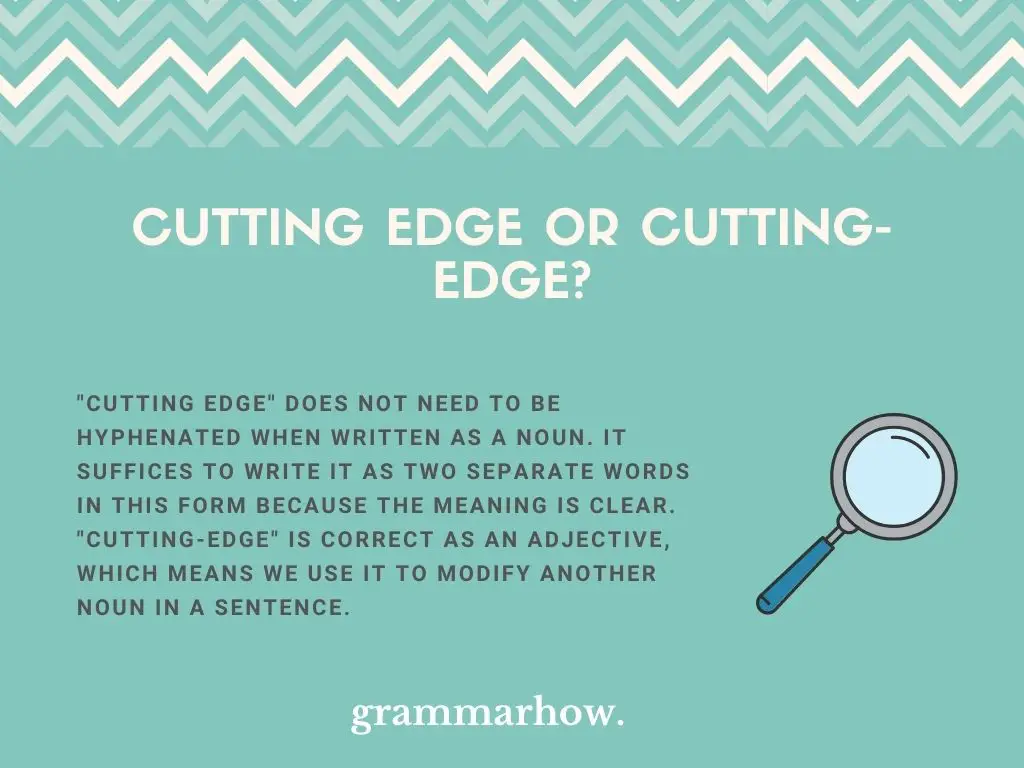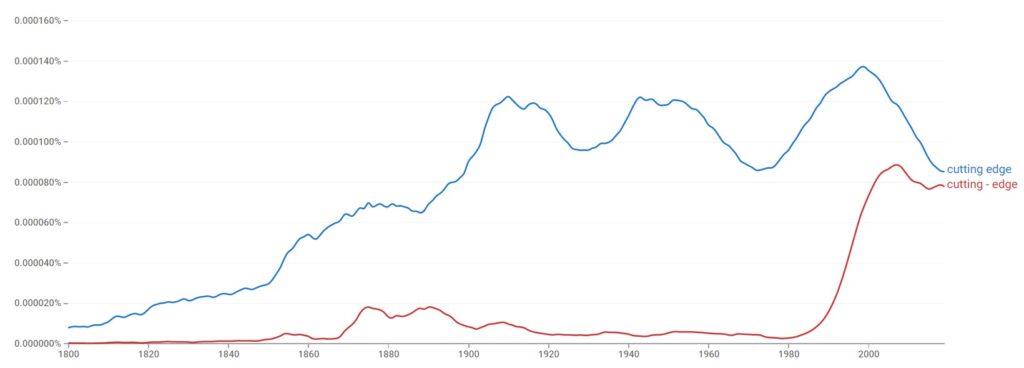We can use “cutting edge” as both a noun and an adjective. Therefore, it would be helpful to know when it’s hyphenated and when it’s one or two words. This article will answer all the confusing questions you might have about this.
Cutting edge vs. Cutting-edge
“Cutting edge” does not need to be hyphenated when written as a noun. It suffices to write it as two separate words in this form because the meaning is clear. “Cutting-edge” is correct as an adjective, which means we use it to modify another noun in a sentence.

According to Google Ngram Viewer, “cutting edge” and “cutting-edge” are almost identical in popularity. We can use both, but it depends entirely on which form we choose to write it in and how well it fits into our sentences with or without the hyphen.

In The Cambridge Dictionary and The Oxford Dictionary, both forms are correct. “Cutting edge” is listed as a noun, which means that something has a sharp edge or is at the most advanced stage of development. However, as a noun, a hyphen is incorrect.
Both dictionaries state that the adjective form is the one we should use when writing “cutting-edge.” We should stick to using the hyphen whenever we are describing something else, which is the officially recognized spelling.
If you’re unsure about the differences between nouns and adjectives, you can refer to the following:
- Noun: He is at the cutting edge of modern technology.
- Adjective: The cutting-edge designs have blown the competition away.
Cutting edge
“Cutting edge” is a noun. We use it without a hyphen when it is being mentioned as a way to talk about sharp edges or advancements in technology or other fields. There is never a requirement to write it with a hyphen in its noun form.
The noun and adjective forms are almost identical in how often they get used. Therefore, there’s no reason for us to tell you that one might be more popular than the other based on contextual choices.
Hopefully, these examples will help to clear things up:
- I am at the cutting edge of my field, and they look to me for help whenever possible.
- This is the cutting edge. You won’t find anything that remotely resembles this work for decades to come.
- This is the cutting edge of modern technology. You’re lucky you get to see this.
- We work at the cutting edge of what’s possible. It’s a joy to behold!
Cutting-edge
“Cutting-edge” is correct when we use it as an adjective. It’s common for adjectives to be grouped with a hyphen because it allows us to show that both of the words are related to the same descriptive tone of the noun we modify with them.
We can refer to the AP Stylebook if we want to learn more about hyphenated adjectives. According to AP rules, we should always hyphenate two or more words that work to describe the same noun in a sentence.
Even if the meaning of the two words is different, we can still use the hyphen to group them until they make sense to the reader.
You might benefit from checking out these examples:
- This cutting-edge invention is going to make my life a lot easier when I’m back at the factory.
- My cutting-edge projects are going to change the way we see the future.
- You have to work a cutting-edge job if you want to advance further in the field of science.
- Do you have any cutting-edge ideas that will help us to get to the top of our competition?
You should hyphenate “cutting-edge” whenever you want to modify another noun. We made sure to include all the nouns in the above examples in such a way to make it easier for you to understand how they interact with the compound adjective form.
Is “Edge” Capitalized In The Word “Cutting-Edge”?
You should not capitalize “edge” in “cutting-edge.” After all, the word is not a proper noun, which means it does not require any capitalization in a normal sentence.
The only time you might find it necessary is if you include it in your title and you think it looks good. If you like to capitalize most other words in your title, it might be smart to also capitalize both parts of the hyphen.

Martin holds a Master’s degree in Finance and International Business. He has six years of experience in professional communication with clients, executives, and colleagues. Furthermore, he has teaching experience from Aarhus University. Martin has been featured as an expert in communication and teaching on Forbes and Shopify. Read more about Martin here.

